
WRITING
When I was 27, I wrote my second feature film. The year was 2016 and dating apps were still pretty popular. I was also single and frustrated, so I decided to channel all that loneliness and angst into my writing. The first draft was called Swipe Right (I know, not that original) and it was about my experiences using Tinder, Bumble, J-date and several other dating apps. It was a cathartic experience to say the least.

I had already written and shot one feature 6 years ago, so I felt like I had a firm grasp on how to do it again… only better. It was a personal story, it was relevant, AND I knew I could shoot it for super cheap. Everything was aligned. Only thing is, I dislike the writing process very much. It’s painful and soul-crushing. To be clear, I LOVE coming up with ideas for movies and conceptualizing the broad-strokes of the story. But when it comes to developing characters with depth, finding the theme, writing a memorable ending where all the seeds planted come together in a beautifully serendipitous way, AND determining why I chose to tell THIS story… I fucking hate it. I’m also super hard on myself and never happy with anything I write. I only move forward if I get resounding positive feedback from everyone. And that rarely happens. So, it wasn’t much of a surprise that I wasn’t overwhelmed with joy when I finished the first draft. In fact, now I felt like more of a failure. Not just at dating, but at writing too.
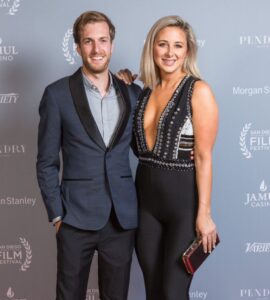
Several weeks later, I met my producing partner (now wife), Victoria. I was casting for a music video for Nigerian rap artist, Wizkid (maybe you know him from his song “Come Closer” feat. Drake), and she came in for the audition. I knew immediately that she didn’t have the part. Despite her being both smart and beautiful (truly), she just wasn’t right for this Nigerian rap video – and so naturally, I didn’t pay much attention. About a week later, she DM’d me on Instagram. She had around 250k followers, so being the superficial guy that I was, naturally, I paid attention. She told me she had a short horror film script but wasn’t sure how to put it into production. So we grabbed a drink at State Social House on Sunset Blvd in West Hollywood, and immediately hit it off. She helped produce a short comedy film I was directing called Acting Class. After doing such an amazing job, I mentioned I was working on writing this movie about online dating and would love it if she would come on board to help me shape the female perspective of things. As a guy, I don’t always write for girls too well. And for this movie, it was super important that everything felt real and true. And so she came on board. We pretty much trashed the first draft (which was the right move), and essentially started from scratch. We even changed the title to Electric Love. We drew from some of our own experiences (miscommunication, jealousy, etc) and poured it all into the script. Being a new relationship, there were many experiences to draw from. After my parents read the script (I don’t always recommend this unless you have a rock-solid relationship with your parents) along with some of our friends, we made the necessary revisions. Finally, in the winter of 2017, we had a completed script. And I actually kinda liked it.
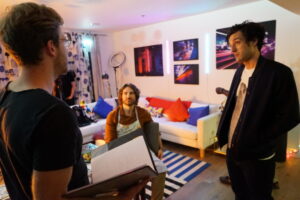
PRE-PRODUCTION
Assuming you have a good script, this is undoubtedly the most important part of the filmmaking process. Before we get into it, I’m sure you’re wondering how we got the money to make this. The financing came from several different places but the bulk of it came from the one thing everyone tells you not to do: invest your own money. I saved up for nearly 6 years and put a lot of my own money into the film. Additionally, Victoria used her background in marketing to lock some brand collaborations and product placement which helped subsidize the cost. For example, she struck a deal with a clothing company (simply by just reaching out). They wrote us a check for a few thousand dollars as well as provided the entire wardrobe which our main character wore throughout. We gave them credit and made a (almost subtle) mention of their brand in the film itself. It didn’t happen overnight though. We literally reached out to about 100 companies (or something close to it) before hearing back from just one. Sure, a part of me wondered if I was selling out by having product placement in my little indie film, but hey, if that’s all it takes to get my film financed and I still maintain 99% creative control, then I’m all for it… personally.
While there’s no strict order of things to do, we began with CASTING. You wanna sell your movie? Get recognizable actors. You wanna make money? GET RECOGNIZABLE ACTORS. They don’t have to be Shailene Woodley, but they should at least be a face that makes your uncle say “where do I know her from?” Yes, yes, yes, there are exceptions to every rule. Like if you’re absolutely genius and you made a film that so simply captures the zeitgeist of today, then you can get away with unrecognizable actors. But I know where I stand and I’m not Nolan, Soderbergh, the Coen Brothers… yet. And so with this in mind, we carried forth.

Making offers to actors is actually quite easy. Sign up for an IMDB Pro account, type in the name of the actor or actress you’d like to make an offer to, find out who their agent or manager is, and then call their office. Tell them you’re making an official offer (small films like this can’t usually afford the luxury of auditions or meetings – it relies on whether or not the material resonates with them and how much you’re willing to PAY). Victoria is a pro at this and yes, she’s available for work if you’re looking for a rock-star producer. We made a few offers to some relatively known actresses for the lead – Analeigh Tipton, Olivia Thirlby, Angela Sarafyan from Westworld, but they all passed. Let’s face it, we’re nobodys. But something amazing came of this… one of these famous actresses had an agent at CAA who also repped some lesser known talents. He happily forwarded an audition tape that one of his clients made for us. And she knocked it out of the park. She wasn’t an A-list celebrity but she had some TV/movie roles and she was the lead of an NBC series that ran for one season called Crowded. Her name is Mia Serafino. Seriously, hire her. She’s the full package, and I’m not just saying that. Anyway, she got the part.
We followed this strategy with casting some other supporting roles – specifically making offers to actors who are repped by agents we already have a relationship with. This is how we cast Kyle Howard (House Arrest, Paper Brigade, Orange County) and comedian Erik Griffin (Workaholics). Again, we didn’t attach A-listers, but we had an incredibly talented cast that consisted of recognizable faces, which in many ways gave the film more credibility. Having lived in LA for several years, I also had plenty of actor friends who I knew would do an exceptional job. And so we cast a good portion of the film that way. We offered the second lead to one of my closest friends Zachary Mooren (hire him too) and some supporting roles to my friends Misha Reeves and Ben Faigus. They all knocked it out of the park.

The rest of pre-production consisted of the usual location scouting (suggestion: don’t shoot in LA; explanation coming), acquiring production insurance, starting an LLC (in most cases, you need a new LLC for every film you make), and submitting the necessary paperwork to the SAG offices. It’s all tedious and time consuming stuff but it’s relatively easy so long as you keep good records and stay organized. I’m not organized but Victoria is; again, emphasizing the importance of a good producer!
PRODUCTION
We shot the entire movie in 19 days plus 1 day of pickups. We shot on the Canon C300 Mark II because our DP AND our B-cam op each owned one and I wanted to shoot on 2 camera (since a lot of the film would be improvised).

Some of the locations we found and even some of the actors we cast were confirmed DURING the shoot. While I would not recommend this, and strongly encourage you do as much pre-production planning as possible, we didn’t have much of a choice. Had we spent more time before shooting, perhaps we would’ve saved some money. In one instance, we were tasked with locking a small hole-in-the-wall taco stand where our two main love interests meet for the first time. We scouted all over LA until finally we found the perfect spot in Silver Lake. We walked in confidently – our heads high – expecting to nab it for $200 for the night. To our naive surprise, they told us they had a super bowl commercial shoot there last week and that it would cost $100 PER HOUR. We shared a nervous laugh, but there was no time to deliberate. I recall negotiating a deal where they gave us a discount on the hourly rate but we ordered our catering from them. That was fine with us. The location was too perfect.
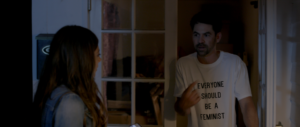
All that aside, the production went very smoothly. There weren’t any crazy horror stories. One thing I can say confidently is that we run a tight set. I usually know exactly what we need and if we don’t get it, I’ve shot enough stuff to know how to improvise effectively. All that comes down to is experience.
POST-PRODUCTION
I cut the whole film myself in under 3 weeks. It was a lot of work, but to be honest, editing is the part I enjoy most. All of my hard work is done, and now I get to sit alone with a cup of coffee and piece together the puzzle… at my own pace. Nobody’s asking me questions. Pure bliss.
Finding a post house to do our color correction and sound was relatively simple (just time consuming). I asked friends from all around LA to send me their recommendations and after an obsessive amount of research and deliberation, I decided to go with a studio that could package all of their services into one. In retrospect, I didn’t save much time or money by going with a post house as opposed to individual freelancers. If anything, I spent more money. Personally, I just preferred having everything done in one place. Unless I have a significantly larger budget on my next film, I’ll probably work with individual freelancers for color and sound mixing/mastering. Whoever you go with, make sure they include an M&E (music & effects track) and a DME (dialogue music & effects track) in your delivery. If you want to distribute your film internationally, you’re going to need this so they can dub funny German voices over your actors. Also, make sure they include a DCP (digital cinema package) so that you can play your film in theaters in the highest possible quality. This is how we were able to screen the movie at film festivals.

Now comes the most painful part. Music supervising. Okay, it wasn’t terrible, but it wasn’t fun. I LOVE picking music for my films, but the legalities of it are horrendous. That’s why you’re supposed to hire a music supervisor. But I decided to do it all myself because we were out of money. Again, wouldn’t recommend doing this unless you’re willing to invest the time to learn (or simply can’t afford to hire someone like me). Every song needs two types of licenses: a master and sync license. The ONLY reason I knew anything about this is because I was lucky enough to have a music supervisor (Jeff DeLia) on my first feature. He was just getting started and like many of us on that project, was willing to work for FREE. If you need a music supervisor, I can’t recommend him enough. I cannibalized our old contracts and created new templates which I sent out to every artist, manager, and label (don’t tell him that). By the end, I wanted to pull my hair out, but I managed to get it done.
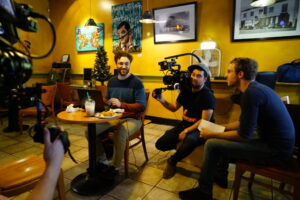
It made things a bit easier when we struck a deal with the manager of the band, Rey Pila, to feature their music in the film. That way, a large percentage of contracts were completed by just one person, instead of multiple different managers from tons of different bands. How did we discover them? My friend Zachary Mooren (who also starred in the film) played me their music and I LOVED it. It nailed the tone of the picture – this sort of modern take on 80’s retro (before everything was a callback to the 80’s). We googled them and found their manager’s contact info. They’re pretty popular in Mexico but not too well known in the US market, so it seemed like a perfect fit. We spoke to the manager on the phone (super sweet guy) and worked out a deal. I also had my ex-roommate musician/producer friend Robot Disco Puma put together the score. And even though he hadn’t ever scored a feature film before, he nailed it.
*I’m aware I keep praising everyone involved in this film, but in all seriousness everyone was on their A-game. Maybe we got lucky, who knows. In reality, I think the older I get the more particular I am about who I work with and the more scrutiny we put everyone under before getting involved. This makes for a more united family of creatives.
DISTRIBUTION
I’m sure many of you just skipped to this one. If not, you’re highly unusual and you’ll be more successful than I. Also, thanks for reading this far, hopefully there’s some useful information. Anyway, here’s how we got our movie on Hulu:
You’re gonna roll your eyes but as I mentioned earlier, I’ve been living in LA for about 9 years. When you spend enough time in one place, you eventually meet people in the same industry (especially if you live in LA). Turns out, Victoria’s ex-roommate’s boyfriend was a producer – not Jerry Bruckheimer, but an accomplished indie producer nonetheless who spent years earning his own relationships. He did us the kind favor of watching our film and passing it on to Gravitas Ventures, a mid-tier distributor of low to medium budgeted films. Now, before you skip this because you’re thinking, “wait a minute, so he just had super crazy connections and here I am in bumfuck Michigan living with my aunt” you can stop right there and KEEP READING. Turns out, Gravitas Ventures has a “submit your film” button on their website. Does it actually work? Yes. I met a filmmaker at a film festival (whoa, really?) in Dubuque, IA. He made a really cool movie and asked if I could submit it for him. And so I did. They ended up passing because it didn’t fit their slate, but they actually watched it and responded. So, good on them.
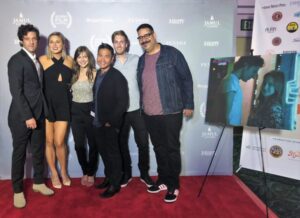
While all of this negotiation with Gravitas was taking place, we found ourselves in a conundrum. Another friend of ours e-introduced us to a sales agent. For those of you who don’t know, a sales agent is a person (or company) with connections to distributors (usually in international markets). They’ll represent your film, take it to markets like Cannes or AFM, sell it to a bunch of different territories and then take a percentage. A trustworthy reputable sales agent can be helpful depending on the film, but you have to be careful. There’s a lot of sharks out there (I learned this the hard way on my first movie).
The sales agent watched our movie and got pretty excited about it. He said he wanted to represent the film worldwide – he even projected somewhere between $500k – $750k in sales. That would be huge, considering our film was made for $100k. But there’s more. He would then own – I forget exactly what it was, but it was somewhere around 15-25% of the movie for the ENTIRE term (so basically forever). On top of that, all the distributors that license the movie from him would take their percentage off the top as well (which is unavoidable unless you self-distribute). Additionally, the sales agent wanted to take $50k off the top for “marketing expenses.” Despite all that, it appeared profitable IF those projections were correct – and there’s no way of knowing. So here lies the conundrum…
Gravitas Ventures offered us a $12k advance. Meaning, they were ready to send us a check for over 10% of our budget back. Which was AWESOME. It was honestly more than I expected to get for a romantic comedy with no A-list actors. But they wanted to own 30%. They also projected the film would gross around $150k – $200k in 2 years. We’re also told by almost everyone we know in the industry that Gravitas is extraordinarily reputable and they’re one of the few distributors that actually PAYS their filmmakers. They’re also known to under-project and over-deliver. It’s all hearsay, but in our experience we only ever heard good things about them.
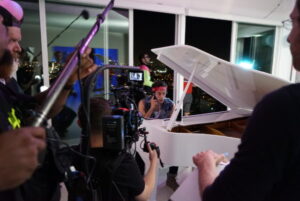
We both lost sleep over this one. Sales agent or direct to distributor? Sure, we could split domestic and international, but that felt messy and the math didn’t make sense. After a couple days of asking everyone what we should do, we finally decided to go with Gravitas Ventures under one condition: they lower their percentage of shared revenue. 30% was too high. With the assistance of our lawyer (get one when you do this, please), we negotiated their share down to 25%. BUT that meant we would NOT get that sweet sweet $12k advance. This was an easy decision because the advance would’ve come out of our first pay anyway. Meaning, if we said yes to the $12k, they would’ve simply just subtracted $12k from the first money that came in. So really, the question was, do you want that advance now and give them 30%? Or do you wanna wait several months, get it later, and give them 25%? So we decided to forgo the advance and offer them 25% ownership in the film. We had a deal.
6 months later, the film was released on digital, VOD, Amazon – basically every pay-per-view platform under the sun. They even licensed it to Sky Cinema in the UK, and a network in Germany. I even saw the trailer re-posted on some German “queer cinema” channel (since a part of the film focuses on Grindr). It was super cool. But still, we were eagerly awaiting whether or not we would get on Amazon Prime, Netflix, or Hulu.

During all of this time, I had submitted the film to several film festivals. We submitted to SXSW. Did not get in. Slamdance. Did not get in. I didn’t even bother submitting to Sundance or any of the MAJOR festivals because I didn’t think this movie would fit and I’d rather put my money toward a bunch of smaller festivals than one big one. Besides, I was incredibly excited when I found out we got into San Diego International Film Festival. In October, 2018, we had our World Premiere of Electric Love. And we WON an award for “Best World Premiere.” Seriously, never saw that coming. We walked the red carpet with John Cho, Topher Grace, Kenny Loggins, and Kathryn Hahn (an eclectic crew I never thought I’d see together). It was insanely surreal. We made friends and forged relationships that will undoubtedly last. Shout out to P.K. for showing us around and making us feel welcome. Then, we had our North American premiere at Cinequest (which my first film, 15 North, got rejected from) so that was a huge personal victory.
Fast forward to summer of 2019. We got an email from Gravitas:

And then we opened a bottle of champagne. Between the international licenses, the rentals and purchases, and this Hulu deal, we’ve nearly recouped the budget. And that’s in less than a year. The term with Gravitas lasts for 7 years so we can expect to make profit on this ultra-low-budget romantic comedy with no A-list actors. To say the least, I’m still surprised. I’m also really proud. Hopefully this is just the beginning…

MARKETING
I told you, distribution is just the beginning. We did 98% of marketing ourselves. Attending film festivals around the country was certainly part of the marketing. Each festival came with their own press and we certainly took advantage of every opportunity we could. Not to mention the fact that by simply just showing up and attending the Q&A’s, you’re making an impression on people. If they like the film, they’ll remember it a lot more if they got to meet the filmmakers. It’s real and it’s powerful. Show up. Represent your movie.
Once the film was available to rent, I put together some digital spots (15 sec and 30 sec) and ran them on Facebook and Instagram. Did this do anything? Honestly I’m not sure. Amazon didn’t allow me to see the analytics on ad-spend to actual rental/purchase conversions. But I did it anyway. I didn’t go too hard, maybe spent a total of $500.
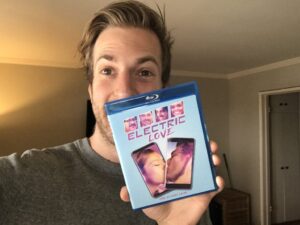
I reached out to hundreds and hundreds of blogs, movie reviewers, film critics, etc. I asked if they could watch our film and review it for us on their site. About 10-15 sites (out of hundreds) responded. We got write-ups in the US and UK. I even posted a picture of myself holding the blu-ray for my movie on the r/filmmaker subreddit (mainly because I was proud and aim to help other filmmakers do the same thing) but it was also effective in marketing the film. I got so much love and support from the Reddit community, so seriously, thank you Reddit.
I also sent our trailer to several YouTube channels that specialize in the release of movie trailers. Surprisingly, a few responded. One channel was called Rapid Trailers – I happened to be somewhat familiar with them. They were the first to respond and post the trailer which now has over 1 million views on YouTube. I don’t know how that happened – maybe a movie about Tinder is relevant enough to share? Maybe one of our actors was recognized? Maybe I’m a genius and I made a film that so simply captured the zeitgeist of today? Definitely not. Either way, the success we’ve had from this film is far greater than anything I’d ever imagined. Can’t wait to do it again.
CHECK OUT THE TRAILER:

